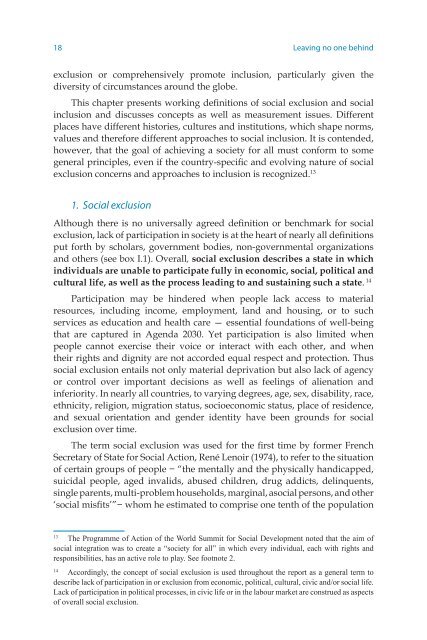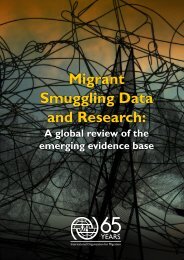Leaving no one behind the imperative of inclusive development
full-report
full-report
You also want an ePaper? Increase the reach of your titles
YUMPU automatically turns print PDFs into web optimized ePapers that Google loves.
18<br />
<strong>Leaving</strong> <strong>no</strong> <strong>one</strong> <strong>behind</strong><br />
exclusion or comprehensively promote inclusion, particularly given <strong>the</strong><br />
diversity <strong>of</strong> circumstances around <strong>the</strong> globe.<br />
This chapter presents working definitions <strong>of</strong> social exclusion and social<br />
inclusion and discusses concepts as well as measurement issues. Different<br />
places have different histories, cultures and institutions, which shape <strong>no</strong>rms,<br />
values and <strong>the</strong>refore different approaches to social inclusion. It is contended,<br />
however, that <strong>the</strong> goal <strong>of</strong> achieving a society for all must conform to some<br />
general principles, even if <strong>the</strong> country-specific and evolving nature <strong>of</strong> social<br />
exclusion concerns and approaches to inclusion is recognized. 13<br />
1. Social exclusion<br />
Although <strong>the</strong>re is <strong>no</strong> universally agreed definition or benchmark for social<br />
exclusion, lack <strong>of</strong> participation in society is at <strong>the</strong> heart <strong>of</strong> nearly all definitions<br />
put forth by scholars, government bodies, <strong>no</strong>n-governmental organizations<br />
and o<strong>the</strong>rs (see box I.1). Overall, social exclusion describes a state in which<br />
individuals are unable to participate fully in eco<strong>no</strong>mic, social, political and<br />
cultural life, as well as <strong>the</strong> process leading to and sustaining such a state. 14<br />
Participation may be hindered when people lack access to material<br />
resources, including income, employment, land and housing, or to such<br />
services as education and health care — essential foundations <strong>of</strong> well-being<br />
that are captured in Agenda 2030. Yet participation is also limited when<br />
people can<strong>no</strong>t exercise <strong>the</strong>ir voice or interact with each o<strong>the</strong>r, and when<br />
<strong>the</strong>ir rights and dignity are <strong>no</strong>t accorded equal respect and protection. Thus<br />
social exclusion entails <strong>no</strong>t only material deprivation but also lack <strong>of</strong> agency<br />
or control over important decisions as well as feelings <strong>of</strong> alienation and<br />
inferiority. In nearly all countries, to varying degrees, age, sex, disability, race,<br />
ethnicity, religion, migration status, socioeco<strong>no</strong>mic status, place <strong>of</strong> residence,<br />
and sexual orientation and gender identity have been grounds for social<br />
exclusion over time.<br />
The term social exclusion was used for <strong>the</strong> first time by former French<br />
Secretary <strong>of</strong> State for Social Action, René Le<strong>no</strong>ir (1974), to refer to <strong>the</strong> situation<br />
<strong>of</strong> certain groups <strong>of</strong> people − “<strong>the</strong> mentally and <strong>the</strong> physically handicapped,<br />
suicidal people, aged invalids, abused children, drug addicts, delinquents,<br />
single parents, multi-problem households, marginal, asocial persons, and o<strong>the</strong>r<br />
‘social misfits’”− whom he estimated to comprise <strong>one</strong> tenth <strong>of</strong> <strong>the</strong> population<br />
13<br />
The Programme <strong>of</strong> Action <strong>of</strong> <strong>the</strong> World Summit for Social Development <strong>no</strong>ted that <strong>the</strong> aim <strong>of</strong><br />
social integration was to create a “society for all” in which every individual, each with rights and<br />
responsibilities, has an active role to play. See foot<strong>no</strong>te 2.<br />
14<br />
Accordingly, <strong>the</strong> concept <strong>of</strong> social exclusion is used throughout <strong>the</strong> report as a general term to<br />
describe lack <strong>of</strong> participation in or exclusion from eco<strong>no</strong>mic, political, cultural, civic and/or social life.<br />
Lack <strong>of</strong> participation in political processes, in civic life or in <strong>the</strong> labour market are construed as aspects<br />
<strong>of</strong> overall social exclusion.
















